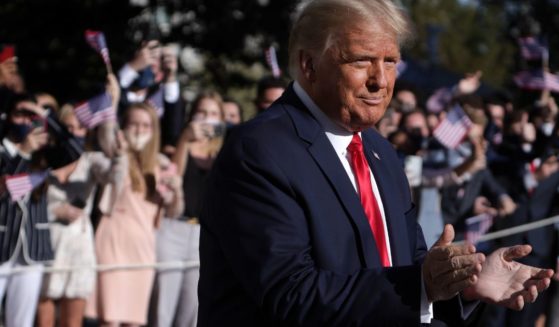
This could make all the difference in a second Trump administration.
Former President Donald Trump has revealed one crucial decision he’d make differently if elected to a second, non-consecutive term in the White House.
Trump shared his thoughts on the topic in an interview with Thomas Klingenstein that ran this week in American Mind, a publication by The Claremont Institute, a conservative think tank.
“I asked President Trump what two or three things he would do differently were he to get a second term. He gave me a very good answer, I think — ‘People, people, people,’” Klingenstein wrote.
Trump pointed to his first term in office as an exercise in determining ideal personnel.
“I now know the right people,” the Republican indicated.
The 45th’s President’s words could indicate that he intends to appoint cabinet officials more selectively, in the event he takes back the White House.
Trump told Klingenstein he had only been to Washington 17 times before his presidential inauguration.
Four years of executive experience could set up Trump for more stable and reliable officials, should he return to the presidency, after extensive warring with his own cabinet during his first term.
Cabinet officials such as Attorney General Jeff Sessions, Secretary of Defense James Mattis, and White House Chief of Staff John F. Kelly became targets of Trump’s criticism after their tenure in government — and in some circumstances, while they were still in office.
The Trump administration was at times destabilized by errant personnel intent on thwarting President Trump’s ‘MAGA’ policy vision, with beltway Republicans instead determined to stage a re-run of George Bush-era neoconservatism defined by Middle East regime-change wars and weak enforcement of American borders.
The establishment of the Republican Party proved capable of securing access to senior positions in the Trump administration, even after viciously opposing the populist billionaire in Trump’s 2016 historic primary campaign.
Trump’s institutional power over the Republican Party has only increased since then.
The de facto Republican leader would be well poised to select officials from an extensive roster of lawmakers and federal appointees who began their Washington careers as Trump supporters — rather than recycled George W. Bush bureaucrats.
Grassroots GOP support for federal candidates who back Trump has also changed the composition of the congressional Republican caucus. In some instances, senators and members of Congress who fervently oppose Trump have been replaced with successors who recognize his importance to their own voters.
Trump leads in virtually every poll for the 2024 Republican nomination, with some surveys indicating Trump already has an outright majority of support from Republican primary voters.
If he’s elected a second time, Trump would become the first American president since Democrat Grover Cleveland to serve non-consecutive terms in the presidency.
